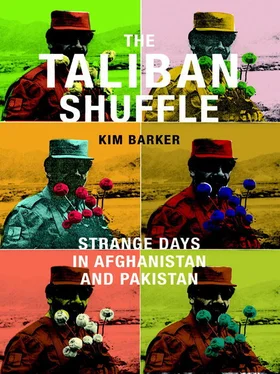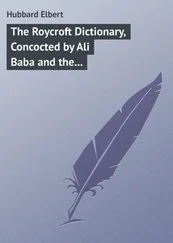“I know everything,” he said.
“Just keep quiet,” a man told him.
“Are you mad?” another asked.
Finally we were allowed to walk around, but only down one street, and only flanked by an escort of about twenty so-called villagers.
“This is entirely pointless,” I said, as one man after another told us that no, this was not the Faridkot we were looking for.
“We should go,” my translator said.
Upon hearing our plans to leave, the mayor asked me to wait. He then ran inside a house and ran out, holding a large white scarf embroidered with pink-and-green flowers. He presented it to me in front of the alleged villagers.
“Because you are our first foreigner,” he said.
I took it. The crowd of alleged villagers clapped. I made a grand speech.
“Thanks so much for this. Your hospitality—threatening to beat us up and set our car on fire, refusing to let us walk around, lying to us consistently, and now this, handing me this scarf so I can cover myself up—it’s truly been amazing. I’m speechless.”
My translator looked at me.
“I really hope none of them speak English,” he said, before sanitizing my speech for the masses. They clapped again. I waved, tossed the scarf in the backseat, and hurtled into the car.
We stopped first at the press club in the neighboring town. A club officer confirmed that the surviving militant was from this Faridkot. A TV journalist who had visited Faridkot earlier said all the villagers said the man was from this Faridkot—off the record.
“But on the record, they refused,” he told us.
While in the press club, my translator’s brother called in hysterics. A police official had just called to tell him that we had been kidnapped. Classic ISI intimidation, designed to scare us into leaving. A friend, another journalist, later called me, saying that he had been told that my translator and I had been beaten up—his glasses and my computer had been broken.
We left. But we also visited the police commander for Okara district and told him about our reception. “I can’t say anything,” he said. A bit later, when the news-agency journalists came to complain about their stolen phones and DVs, the commander made a call.
“Sir,” he said, “your men have snatched the journalists’ DVs and telephones. You can erase the images, but please give them back to the journalists.”
Nothing odd going on, nothing at all.
Wary of the reach of both the ISI and Nawaz Sharif, Samad and I decided to drive all the way to Islamabad that night, dropping off our translator on the side of the road near Lahore.
“I’m leaving town for a while,” he said. “I’ll probably go underground. You won’t be able to reach me.”
This cloak-and-dagger show could strangle the country. One journalist we met was arrested after my story. I later tried to help another journalist, threatened by the ISI after his TV report aired, get out of Pakistan, without success. Even a year later, any journalist who went to this Faridkot would risk arrest or harassment by the agencies, who stalked this corner of nothing like a traffic cop looking for his quota.
My story ran on the front page. The next day was Eid. I opened my front door and saw rivulets of blood running down the street from all the animals gutted to mark the holiday. A man in a tan salwar kameez stained with blood walked down the middle of the street, holding a dripping knife, his eyes glazed. Anywhere else in the world, I would have run away screaming. Here, this was normal. Considering everything happening in the country, all the blood and gore, I barely noticed that the Tribune Company had just filed for bankruptcy. Sacrifice? I was a newspaper reporter working for a bankrupt company in the middle of the war on terror. I was standing in line like a dumb steer in a chute in Montana, and I didn’t even know it.
CHAPTER 24
BAD LIVER AND A BROKEN HEART
The threat of war loomed between Pakistan and India. I had been through this before—back in 2002 and 2003, when the two countries bumped chests the last time around, after the attack on India’s parliament was blamed on Lash militants. Because of our history, I treated this display of force between the two neighbors as what it was—a chest-thumping drama worthy of an Indian movie. Now that both countries had nukes, and now that both countries salivated for U.S. approval, war was unlikely. Still, we all wrote stories about the two nations being on the verge of hitting the button. Everyone pumped it up like a championship football match.
Unfortunately, I had planned a real vacation between Christmas and New Year’s Eve for the first time in years. I was supposed to go to California for a friend’s wedding. I had even bought a ticket.
“Nothing’s gonna happen after Christmas,” I told my boss.
“I’m not even going to respond to that,” he said.
“But I’m supposed to be on vacation.”
“We’ll see.”
Until his verdict, I worked. While Samad and I were about ninety minutes outside Lahore one afternoon, reporting on how the main Jamaat-ud-Dawa campus was up and running despite Pakistani claims to have shuttered the charity, I glanced at my BlackBerry. Farouq had written an e-mail. He was slightly hurt because I hadn’t told him I was coming to Afghanistan the next day to interview President Karzai. I called him.
“What interview with Karzai?”
“I heard you had an interview with Karzai.”
“No. I’ve repeatedly asked for one. But they haven’t told me anything.”
Farouq, helping the New York Times with the kidnapping of its reporter, said a photographer told him I had an interview with Karzai.
“What? No. I think they would have told me.”
We hung up. I thought for a minute. I had been pushing for an interview for months, relying primarily on my good friend Barack Obama. My argument went like this: Obama was probably going to be president. Obama thought Afghanistan was really, really important. Obama was a U.S. senator from Illinois. I worked for his hometown newspaper. Therefore, the president of Afghanistan should talk to me. Now that Obama had actually been elected, this ridiculously thin argument may have actually worked. It would be a coup—Karzai had granted very few interviews in recent months. I called Karzai’s spokesman, aware of the government’s incompetence.
“Do I have an interview with Karzai tomorrow?” I asked.
“Yes,” he said.
“Maybe someone should have told me.”
“I thought I did,” he said. “I sent you a note on Facebook.”
“I didn’t get it.”
“Sorry about that,” he said, although he clearly wasn’t. “Can you be here at noon?”
“No. I’m in Pakistan, and I’m in the middle of nowhere, Pakistan. I think it’s highly unlikely I could get there by noon.”
“How’s four?”
I said I’d check. The morning flight to Kabul was sold out, but my travel agent, a friend, promised to get me on the plane if I could make it back to Islamabad. Samad drove us back the six hours, pulling into the capital before midnight. The next morning, he rushed me to the Afghan embassy where I picked up a visa in a record fifteen minutes.
After a quick flight and a harried attempt at scribbling questions, I was ushered in to see Karzai, who looked tired and gray, a dehydrated version of his earlier self.
“It’s nice to meet you, ma’am,” he said, standing to shake my hand.
I didn’t tell him that we’d met before. Our interview was strange and rambling, and Karzai jumped from subject to subject, failing to take any responsibility for all that had gone wrong in his country. He blamed the U.S.-led coalition for hiring “thugs or warlords or whatever,” and then going with “those thugs to the homes of hundreds of elders and community people,” which “frightened them into running away from Afghanistan.” I had a hard time understanding exactly what Karzai meant. At some points, he seemed distracted. His voice occasionally went up several pitches—when he said “high time,” the “high” sounded a good sixteen notes higher than “time.” His face twitched continually, evidence of an attack on him years earlier. Karzai made sense when he talked about the failures of the international community—they didn’t understand the damage from civilian casualties, didn’t train the police, didn’t focus enough on militant sanctuaries in Pakistan. But he seemed completely oblivious to his own failures, except that he had been too soft with his initial complaints to the international community. His points on the Taliban were just bizarre. He wanted to negotiate with the Taliban but didn’t know where to find them.
Читать дальше











